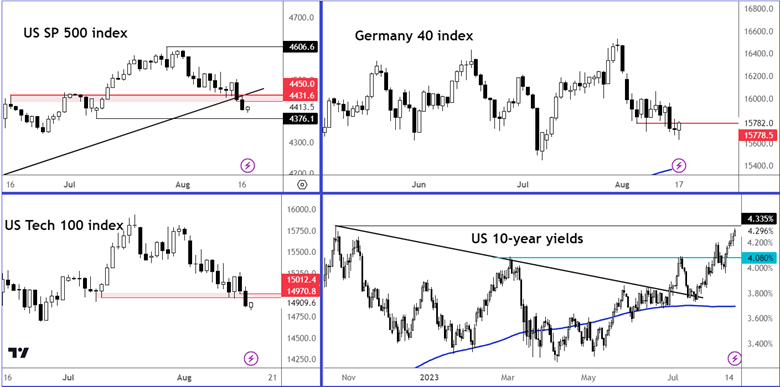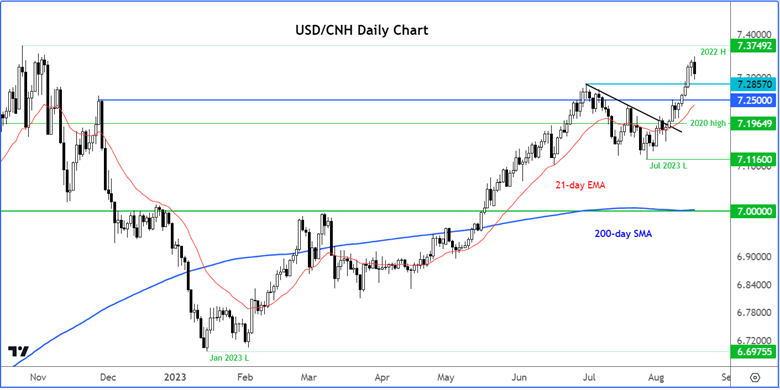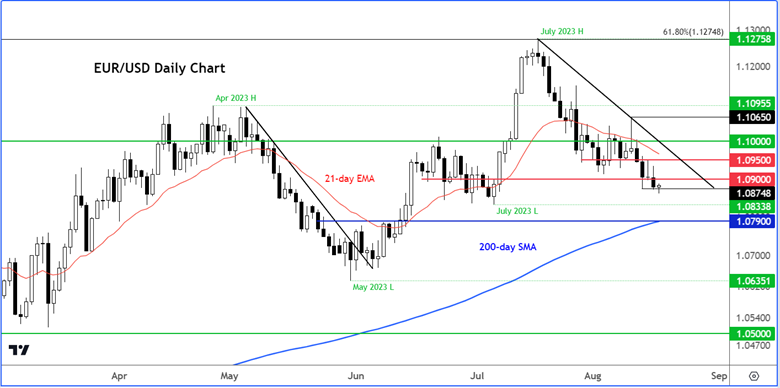Like the first half of Wednesday’s session, there was a slightly positive tone in markets Thursday with European equity indices and US index futures bouncing sharply off their earlier lows, tracking a strong Chinese yuan and firmer metal prices, states Fawad Razaqzada of Trading Candles.
The moves are partly due to China’s efforts to prop up the yuan, but this is unlikely to have lasting impact on the wider financial markets.
US 10-year Yields Approaching Oct 2022 High
The major indices were higher across the board by mid-day in London, but keep an eye on rising US bond yields, as they approach last year’s high:

If yields continue to push higher, this could trigger fresh falls in equity markets and therefore weigh on the positively correlating EUR/USD. Rising yields have discouraged investors from investing into growth stocks, which is why the Nasdaq has been underperforming of late. A surprisingly resilient US economy is helping to keep bond yields supported, making stocks, which have low dividend yields less attract compared to the higher “risk free” returns from investing in government bonds.
S&P 500 Technical Analysis
With the S&P 500 breaking and closing below its bullish trend line on Wednesday, the path of least resistance is to the downside until proven otherwise. Therefore, the recovery we are seeing in the futures market could fade later when the cash markets open. Key resistance is now the prior support area around 4431 to 4450 (see red shading on the chart).
The Nasdaq 100 also broke and closed below its own key support area around 15,000. This area is now the most important resistance zone to watch. The path of least resistance is to the downside for the Nasdaq unless we reclaim this area or see a key reversal pattern at lower levels first.
PBOC’s Papering Over Cracks With Yuan Fixing
The slight positive tone in markets was perhaps triggered by China ramping up its efforts to stem losses in the yuan. The country’s central banks, the People’s Bank of China set the fixing for the yuan at 7.2076 per US dollar overnight, which was sharply lower from the day before of around 7.2994, representing the largest gap since October. This caused the USD/CNH pair to turn lower:

In recent days, traders have used the yuan as a proxy for risk appetite, since the currency closely tracks the country’s economic performance. Its repeated falls to fresh yearly lows was already hurting Chinese stocks, failing to keep up with the rising markets elsewhere in the world previously. But in recent weeks, other markets have started to feel the squeeze, too, with US indices falling to fresh four-week lows this week and European markets also falling significantly, along with the euro.
The fact that China is now intervening more aggressively goes to show how concerned the government has become about the state of the world’s second largest economy. The markets have found mild support from this, but on second thought it might release that, actually, China’s yuan fixing is akin to papering over the cracks. So, it remains to be seen how much of a lift this will provide the markets. Hint: I don’t think it will very much.
Firmer Tone Boosts EUR/USD
The EUR/USD’s bearish trend has weakened after PBOC attempted to boost the yuan. But with US data continuing to remain resilient, the path of least resistance remains to the downside. China’s efforts to prop up the yuan, is also unlikely to have lasting impact on the wider financial markets.
The EUR/USD has been a bit more hesitant to go lower than in recent days, in part because of the US dollar reaching technical ‘overbought’ levels and the fact we have seen some surprisingly strong Eurozone industrial production (+0.5% m/m) and GDP (0.3% Q/Q) data. But with the more forward-looking indicators pointing at a slowdown, especially in Germany, the EUR/USD may be hesitant to go higher. Indeed, a leading survey of about 300 German institutional investors and analysts (i.e., ZEW) released on Tuesday revealed that current conditions have deteriorated further, even if they are less pessimistic about the future. The German August ZEW survey current conditions printed -71.3, its lowest level since October.
So, if we do see a rally in this pair, it will most likely be because of US dollar losing its appeal—say, as a result of profit taking or peak rates being fully priced in—than the euro finding love. But in the short-term, the EUR/USD direction will be primarily driven by events taking place in China. Despite today’s bounce, the path of least resistance remains to the downside until the charts tell us otherwise.
Focus Remains on US dollar
The US dollar found only mild support from the FOMC minutes that were released late in the day on Wednesday, which signalled FOMC’s opening to more tightening. Needless to say, market pricing did not move much with the probability of another Fed rate hike remaining around 13% in September (35% in November.)
Attention remains on macro data, with jobless claims coming in roughly in line with estimates at 239K after last week’s surprise jump by 250K. The Philly Fed manufacturing index came in better at 12.0 vs. -9.8 eyed, improving sharply from -13.5 previously. After a stronger industrial production data on Tuesday, investors remain hopeful that a hard landing will be avoided in the US. For this reason, traders are struggling to find good reason to sell the dollar, apart from the fact it is starting to look a little bit overbought.
In recent weeks the greenback has been finding support from several sources—weakness in China, rising real US bond yields and weakness in Eurozone data. The release of stronger US retail sales data and industrial production data this week only helped to reinforce the view the US economy is holding its own relatively well in what should, in theory, be a challenging environment for the consumer faced with high inflation and interest rates. Fears over a hard landing have diminished, and now many analysts only expect to see the US economy experience a soft economic landing. Expectations that interest rates may have to remain high in the US for longer is what is helping to keep bond yields—and the US Dollar Index—elevated.
EUR/USD Technical Analysis
The EUR/USD’s grip on the key 1.0900 support level was lost on Wednesday after the test of the key resistance around 1.0930/50 area, a previously support zone, was met with decent selling pressure. So, the EUR/USD closed the session lower, confirming the ongoing bearish bias.

The 1.0900 level is now going to be the first line of defence for the bears, followed by 1.0950ish area. For as long as they defend these levels, then the EUR/USD could be heading below the July low at 1.0833, with the 200-day average being the subsequent target around 1.0785.
The bulls will want to see a higher high now before becoming confident that rates have bottomed. As a minimum, they want to see 1.0950 reclaimed on a closing basis, while a move above 1.1000 would be more ideal. The most recent high comes in at 1.1065 and this level would be the line in the sand for many bearish speculators, I would imagine.
Source for all charts used in this article: TradingView.com
To learn more about Fawad Razaqzada visit TradingCandles.com.











